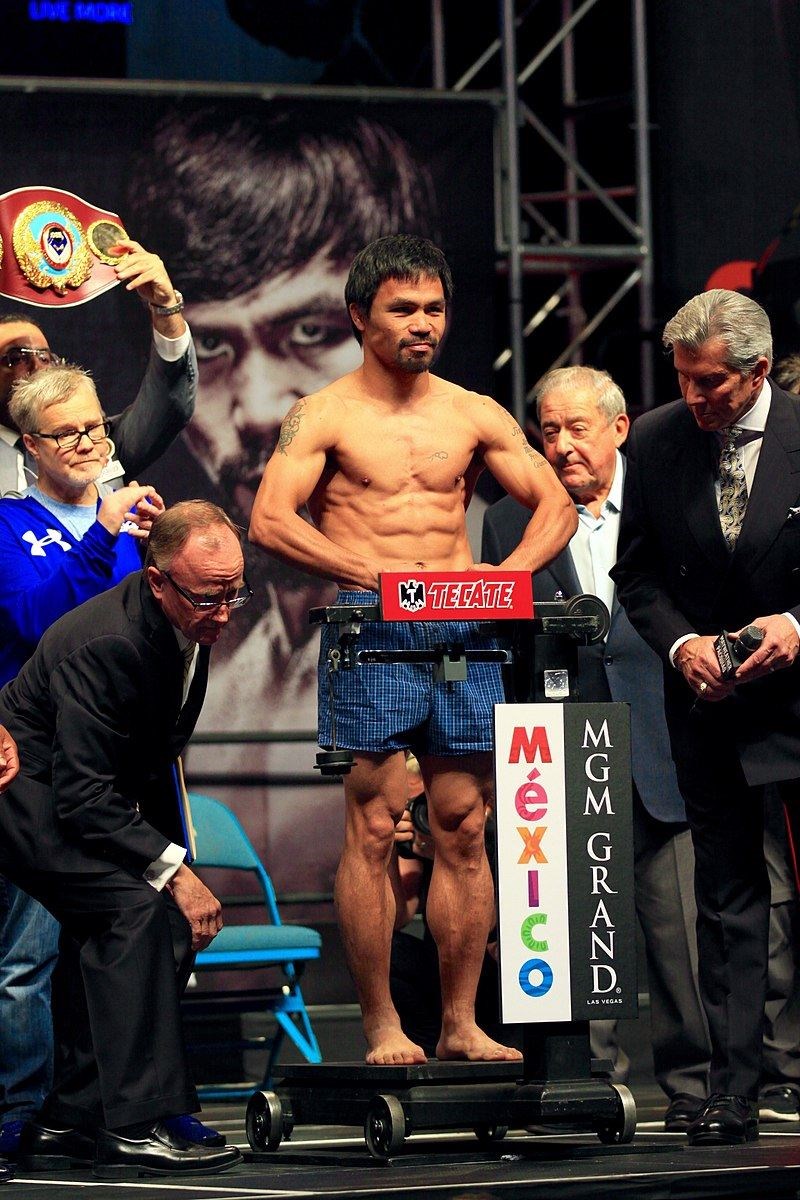 Not All Heroes Wear Capesrcelis - https://pixabay.com/en/manny-pacquiao-boxer-boxing-athlete-1212545/ archive copy at the Wayback Machine (archived on 6 June 2018)Within each of our hearts lies a spark, smoldering within the confines of our mental barriers. This spark can begin the flame of heroism. It can ignite at anytime, and can burn intensely as we learn to embrace it. Everybody has the ability to become a hero and embody the honorable qualities and traits that define heroism. In our world, there are people who possess these heroic qualities, and deserve to be named a hero. Some heroes may directly affect the lives of many, while others can exert a more subtle form of heroism, inspiring others with their heroic way of life. The firefighters working to save burning houses, the politician standing up against discrimination, or the hard working soldiers that protect our country, all exhibit a form of heroism that is clearly evident. Heroes always fight for an improvement in the lives of others, and devote their lives to benefiting the world around them. They play an important part in our society by acting as role models for honorable, moral lives. This is evident in the obsession society has for comic superheroes and the incredible feats they accomplish. They are looked up to for guidance on how to act and live up to the heroic traits that are revered in society. The traits that define a hero are visible through the hero’s actions and beliefs, and make the hero’s way of life a truly inspiring lifestyle. But what truly defines a hero? A hero is someone who never backs down or gives up in the face up failure, and is determined to achieve success no matter the consequences. A hero demonstrates selflessness and cares about all people in the world, and prioritizes the lives of others. A hero is like a great tree, well rooted into the ground during a storm; determined to provide safety and shelter for others at the expense of their own limbs and leaves. Heroes inspire others to always act in a selfless manner and to never give up no matter what hardships they have to endure on their path to success.
Not All Heroes Wear Capesrcelis - https://pixabay.com/en/manny-pacquiao-boxer-boxing-athlete-1212545/ archive copy at the Wayback Machine (archived on 6 June 2018)Within each of our hearts lies a spark, smoldering within the confines of our mental barriers. This spark can begin the flame of heroism. It can ignite at anytime, and can burn intensely as we learn to embrace it. Everybody has the ability to become a hero and embody the honorable qualities and traits that define heroism. In our world, there are people who possess these heroic qualities, and deserve to be named a hero. Some heroes may directly affect the lives of many, while others can exert a more subtle form of heroism, inspiring others with their heroic way of life. The firefighters working to save burning houses, the politician standing up against discrimination, or the hard working soldiers that protect our country, all exhibit a form of heroism that is clearly evident. Heroes always fight for an improvement in the lives of others, and devote their lives to benefiting the world around them. They play an important part in our society by acting as role models for honorable, moral lives. This is evident in the obsession society has for comic superheroes and the incredible feats they accomplish. They are looked up to for guidance on how to act and live up to the heroic traits that are revered in society. The traits that define a hero are visible through the hero’s actions and beliefs, and make the hero’s way of life a truly inspiring lifestyle. But what truly defines a hero? A hero is someone who never backs down or gives up in the face up failure, and is determined to achieve success no matter the consequences. A hero demonstrates selflessness and cares about all people in the world, and prioritizes the lives of others. A hero is like a great tree, well rooted into the ground during a storm; determined to provide safety and shelter for others at the expense of their own limbs and leaves. Heroes inspire others to always act in a selfless manner and to never give up no matter what hardships they have to endure on their path to success.
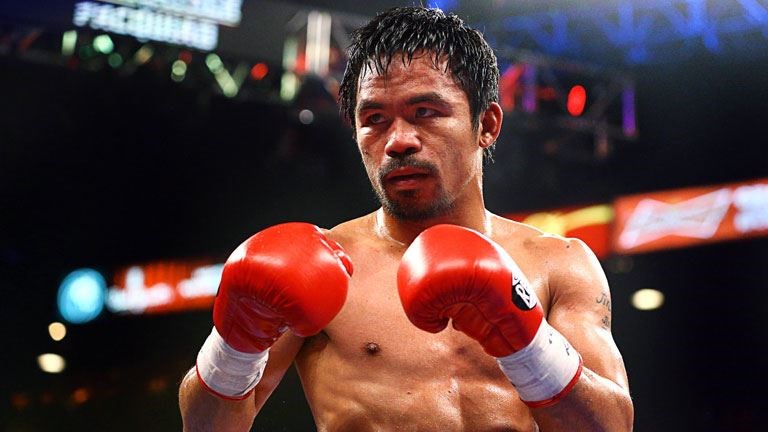 Emmanuel Dapidran PacquiaoBy SUNIL GROVER - Own work, CC BY-SA 4.0, https://commons.wikimedia.org/w/index.php?curid=58071159The Filipino professional boxer Emmanuel Dapidran Pacquiao is the epitome of these heroic traits, and acts as a role model for many. Emmanuel Dapidran Pacquiao, or more commonly known as Manny Pacquiao, was born on December 17, 1978, into a life of poverty and suffering. Born in Kibawe, in the Philippines, he was immediately thrust into a harsh, poor environment. As the second of four children, Pacquiao worked hard at a young age in order to earn money to feed his family and first began boxing during his early teenage years for money. He had dropped out of school at this point to help his family make money by selling donuts and bread. Throughout his early fights, Pacquiao realized that he enjoyed boxing, and at age 15 traveled to Manila to fight his first professional fight and start his boxing career. He then continued to box professionally, earning many titles and victories with his five foot five inch, lightweight frame. Manny Pacquiao, also known as The Destroyer, and Pac-man, is now the first person to gain 11 world titles in eight different weight classes, and has won 59 professional fights. He faces the most impossible odds and yet emerges victorious, due to his iron-will and hard training. He inspires many people with his victories against all odds, and continues to better the world in anyway he can as a congressman of the Philippines. Heroes must have the highest level of determination that enables them to face down great obstacles and not give up, and see that they achieve success. Heroes must also always care for others, and be selfless enough to prioritize the lives and overall welfare of people around them as the number one cause for fighting on. Manny Pacquiao exhibits the definition of a hero as shown through his relentless determination to achieve success, and his selfless way of life that inspires others to live up to their own values and embrace an altruistic lifestyle.
Emmanuel Dapidran PacquiaoBy SUNIL GROVER - Own work, CC BY-SA 4.0, https://commons.wikimedia.org/w/index.php?curid=58071159The Filipino professional boxer Emmanuel Dapidran Pacquiao is the epitome of these heroic traits, and acts as a role model for many. Emmanuel Dapidran Pacquiao, or more commonly known as Manny Pacquiao, was born on December 17, 1978, into a life of poverty and suffering. Born in Kibawe, in the Philippines, he was immediately thrust into a harsh, poor environment. As the second of four children, Pacquiao worked hard at a young age in order to earn money to feed his family and first began boxing during his early teenage years for money. He had dropped out of school at this point to help his family make money by selling donuts and bread. Throughout his early fights, Pacquiao realized that he enjoyed boxing, and at age 15 traveled to Manila to fight his first professional fight and start his boxing career. He then continued to box professionally, earning many titles and victories with his five foot five inch, lightweight frame. Manny Pacquiao, also known as The Destroyer, and Pac-man, is now the first person to gain 11 world titles in eight different weight classes, and has won 59 professional fights. He faces the most impossible odds and yet emerges victorious, due to his iron-will and hard training. He inspires many people with his victories against all odds, and continues to better the world in anyway he can as a congressman of the Philippines. Heroes must have the highest level of determination that enables them to face down great obstacles and not give up, and see that they achieve success. Heroes must also always care for others, and be selfless enough to prioritize the lives and overall welfare of people around them as the number one cause for fighting on. Manny Pacquiao exhibits the definition of a hero as shown through his relentless determination to achieve success, and his selfless way of life that inspires others to live up to their own values and embrace an altruistic lifestyle.
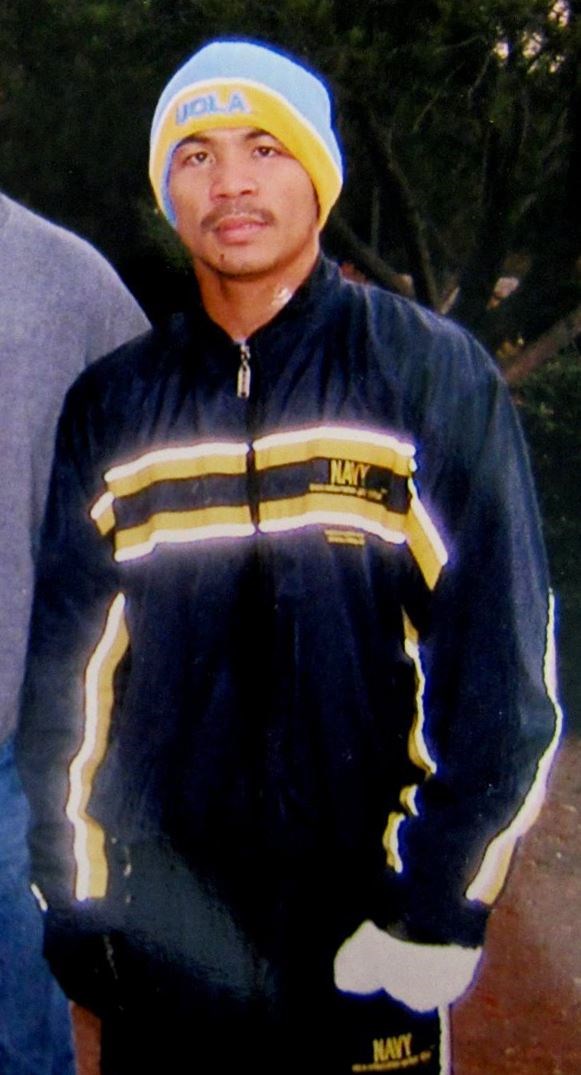 The PacmanSC Ryan A on Picasa Web Albums - originally posted to Picasa Web Albums, https://commons.wikimedia.org/wiki/File:Manny_Pacman_Pacquiao_1.jpgPacquiao shows his relentless determination to fight inch by inch towards success through his hard work and his persistence in the face of defeat and failure. When Pacquiao described his reactions to the failures in his career, he wrote: “After my defeat in 2007, it would have been easy, and maybe normal, to have forgotten any aspirations of public service. But I couldn't forget my people and where I had come from. I am not someone who takes no for an answer. I just knew I had to work harder, I had to be persistent and persevere and never give up” (Pacquiao 193). Through this statement Pacquiao hints to his inner doubts regarding his continued service to the public. However, Pacquiao demonstrated his persistence by choosing to fight on and not give up on his people in the face of failure and uncertainty. This quality is necessary in an ideal hero because a real hero should never give up in the face of failure, but should show persistence in defeating any obstacles that may arise. Heroes must be able to conquer any doubts they may have about their service to society as a role model, and must be able to perform their duty with confidence. Pacquiao also demonstrated this determination when he was set to fight his boxing idol who seems to be more than he can handle:
The PacmanSC Ryan A on Picasa Web Albums - originally posted to Picasa Web Albums, https://commons.wikimedia.org/wiki/File:Manny_Pacman_Pacquiao_1.jpgPacquiao shows his relentless determination to fight inch by inch towards success through his hard work and his persistence in the face of defeat and failure. When Pacquiao described his reactions to the failures in his career, he wrote: “After my defeat in 2007, it would have been easy, and maybe normal, to have forgotten any aspirations of public service. But I couldn't forget my people and where I had come from. I am not someone who takes no for an answer. I just knew I had to work harder, I had to be persistent and persevere and never give up” (Pacquiao 193). Through this statement Pacquiao hints to his inner doubts regarding his continued service to the public. However, Pacquiao demonstrated his persistence by choosing to fight on and not give up on his people in the face of failure and uncertainty. This quality is necessary in an ideal hero because a real hero should never give up in the face of failure, but should show persistence in defeating any obstacles that may arise. Heroes must be able to conquer any doubts they may have about their service to society as a role model, and must be able to perform their duty with confidence. Pacquiao also demonstrated this determination when he was set to fight his boxing idol who seems to be more than he can handle:
When it was determined that Pacquiao would fight American boxer Oscar De La Hoya, many observers speculated that Pacquiao was out of his league. De La Hoya had won ten titles in six weight classes and was a former Olympic gold medal winner. At the time, he also outweighed Pacquiao by 20 pounds. When they met in the ring on December 13, 2008, in Las Vegas, the general opinion was that it was a severe mismatch. However, Pacquiao made headlines when he beat De La Hoya in an eighth-round technical knockout. (Newsmakers)
Pacquiao demonstrated determination through his courage when facing the probability of losing a fight. Even though he was set to fight someone that had greater advantages in height, weight and skill, Pacquiao did not cower down and refuse to fight. Instead, he held his head high and went on to gain his victory against De La Hoya. This shows that Pacquiao is deserving of the title “hero” because he is able to face down larger and stronger opponents and not cower down. Heroes must possess this kind of determination and persistence to make sure that they will never give up or back down from any challenge or obstacle.
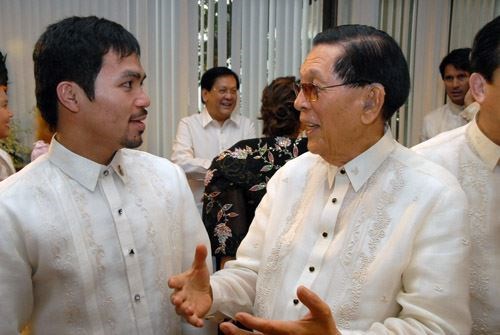 Manny Pacquiao, "The Nation's Fist"By Public Relation and Information Bureau - Public Relation and Information Bureau, Senate of the Philippines, Public Domain, https://commons.wikimedia.org/w/index.php?curid=47008575Pacquiao exhibits his selflessness through his loyal actions to benefit his family and his friends in every way possible. When Pacquiao described his childhood life in poverty, he remembered his thoughts on the lives of more wealthier people: “. . . I remember thinking about those things and wishing I could give them to my family. I wanted my mother to be happy and comfortable just like these people were. I wanted my mother to smile. . .” (Pacquiao 42). Even though Pacquiao lived in the same level of poverty as his family, he wished his mother could live the wealthy life that he saw in others. As a child, this reveals Pacquiao’s incredible level of selflessness. When Pacquiao saw the easy lives of wealthy people, his first thoughts were of his mother, and his wish for her to be happy. Pacquiao’s altruism is clearly evident as he did not want the easy life for himself, but wished he could somehow give it to his family. Pacquiao’s selflessness demonstrates that he is a hero because he prioritizes others over himself. He is able to resist falling into the pit of self pity and is more content if his family could be living a happy, untroubled life. Manny Pacquiao also showed his selflessness when he recalled the sacrifices he had to make in order to provide for his family. He described his efforts in the Philippine City Manila, and wrote: “. . . I slept on the streets and had no food to eat. . . Finally my hard work paid off and I was able to send some extra money home to my family. That fed my spirit in a way that was ultimately satisfying. For three joyously work-filled months i wrote my mother every week and included about 300 pesos with each letter.” (Pacquiao 54). Pacquiao demonstrated his altruism by always choosing the welfare of his loved ones over himself and doing anything to benefit them. Even when he was fighting to feed himself in a different city, he chose to risk his own survival in order to send some money to his family who was struggling with poverty in their hometown. Even though he risked his survival by sending his hard-earned money to his family, he gained the ultimate satisfaction and happiness from helping his family survive. Pacquiao’s actions demonstrate how much of an important quality selflessness is in heroes, in order to empathize with the lives and troubles of others. His decision in Manila to sacrifice some necessities to send money home to provide for his family shows Pacquiao’s love and altruism. Not only did he overcome the temptation to give in to his desires, but he was also able to gain happiness from providing for his family at the expense of his own health. A hero prioritizes the lives and feelings of others and Pacquiao clearly exhibits this quality. His way of caring for the health and comfort of his loved ones over his own reveals his selflessness and his right to be called a hero.
Manny Pacquiao, "The Nation's Fist"By Public Relation and Information Bureau - Public Relation and Information Bureau, Senate of the Philippines, Public Domain, https://commons.wikimedia.org/w/index.php?curid=47008575Pacquiao exhibits his selflessness through his loyal actions to benefit his family and his friends in every way possible. When Pacquiao described his childhood life in poverty, he remembered his thoughts on the lives of more wealthier people: “. . . I remember thinking about those things and wishing I could give them to my family. I wanted my mother to be happy and comfortable just like these people were. I wanted my mother to smile. . .” (Pacquiao 42). Even though Pacquiao lived in the same level of poverty as his family, he wished his mother could live the wealthy life that he saw in others. As a child, this reveals Pacquiao’s incredible level of selflessness. When Pacquiao saw the easy lives of wealthy people, his first thoughts were of his mother, and his wish for her to be happy. Pacquiao’s altruism is clearly evident as he did not want the easy life for himself, but wished he could somehow give it to his family. Pacquiao’s selflessness demonstrates that he is a hero because he prioritizes others over himself. He is able to resist falling into the pit of self pity and is more content if his family could be living a happy, untroubled life. Manny Pacquiao also showed his selflessness when he recalled the sacrifices he had to make in order to provide for his family. He described his efforts in the Philippine City Manila, and wrote: “. . . I slept on the streets and had no food to eat. . . Finally my hard work paid off and I was able to send some extra money home to my family. That fed my spirit in a way that was ultimately satisfying. For three joyously work-filled months i wrote my mother every week and included about 300 pesos with each letter.” (Pacquiao 54). Pacquiao demonstrated his altruism by always choosing the welfare of his loved ones over himself and doing anything to benefit them. Even when he was fighting to feed himself in a different city, he chose to risk his own survival in order to send some money to his family who was struggling with poverty in their hometown. Even though he risked his survival by sending his hard-earned money to his family, he gained the ultimate satisfaction and happiness from helping his family survive. Pacquiao’s actions demonstrate how much of an important quality selflessness is in heroes, in order to empathize with the lives and troubles of others. His decision in Manila to sacrifice some necessities to send money home to provide for his family shows Pacquiao’s love and altruism. Not only did he overcome the temptation to give in to his desires, but he was also able to gain happiness from providing for his family at the expense of his own health. A hero prioritizes the lives and feelings of others and Pacquiao clearly exhibits this quality. His way of caring for the health and comfort of his loved ones over his own reveals his selflessness and his right to be called a hero.
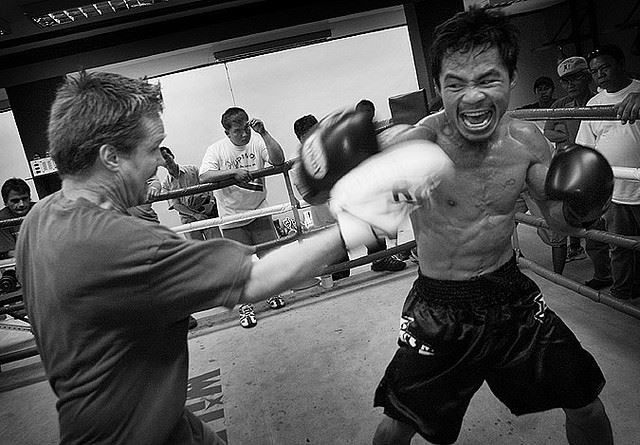 Pacquiao "The Destroyer"Originally posted to Flickr(https://www.flickr.com/photos/roger_alcantara/ - https://www.flickr.com/photos/roger_alcantara/300520912/sizes/z/in/photostream/), was reviewed on 23 November 2011 by the administrator or reviewer Ww2censor, https://commons.wikimedia.org/wiki/File:Pacman.jpg Pacquiao demonstrates that he is deserving to be called a hero through his endless determination to achieve success and his overwhelming selflessness for his family, his friends, and his country. He never backs down against any opponent and displays to others that believing in one’s self will allow one to achieve any goal no matter the odds. Many people expected Pacquiao to lose against some of his opponents based on their successful reputations, but Pacquiao did not lose heart. He used his overwhelming determination to train harder than his opponents and defeated them in battle. His opponents may have had an advantage of size, strength, weight, and experience, but none could defeat Pacquiao and his incredible determination. When Pacquiao’s current life is compared to his previous life of poverty, it is a true miracle: “If Pacquiao's life started with less than rags, through boxing he achieved more than riches. As a teenager, he spent his days punishing heavy bags and his nights sleeping on the gym floor” (Christianity Today). Pacquiao may have come from a life of poverty and every disadvantage imaginable for a growing boxer, but he worked hard to create his own success, and gained happiness by providing for his family at the expense of his own comfort and health. He gives me living proof that an optimistic mentality, relentless determination, and a selfless way of life will allow me to achieve my own success, and benefit the world in the way I can. Pacquiao inspires me to disregard my small stature and other disadvantages I have. With this motivation, I have joined the wrestling team for my school in the 120-pound weight class. I have confidence that training hard and not giving up will allow me to become a skilled wrestler and make myself a name in the wrestling community. I recently placed 4th out of 20 contestants at the John Bright Memorial Wrestling Tournament with the determination Manny Pacquiao inspired me to have. In the tournament, I lost my second match against another wrestler and was devastated by my loss. However, I ignored the instinct to give up and I fought even harder, winning the next three fights and earning myself a place in the top five wrestlers of my weight class. Like Pacquiao, I had to deal with the loss of a fight, but I had the help of his inspiration. He proved to me that determination and selflessness will lead to success and he was right. I congratulated all of my opponents after the fights, wishing to erase any bitterness they may have. By smiling at them and seeing the happiness on their faces as I congratulated them, the taste of victory grew sweeter. Again, Pacquiao´s selflessness motivated me to live up to my own values, and it benefited both me and my opponents in the end. I am motivated to live my life to its greatest capacity, and with the inspiration of Manny Pacquiao, I aspire to live up to my heroic values and hope to inspire others to be a hero. Through his success achieved exhibiting heroic qualities, Pacquiao shows the world that anybody is capable of anything, as long as they have heart in themselves, and the people around them. Heroes like Manny Pacquiao can ignite the spark of heroism that lies slumbering in our hearts with the inspiration of their own roaring flame. They inspire us to live up to our own heroic values and to create our own futures that lead us to success. And once the flame of heroism erupts within our souls, perhaps we can too, pass on the flame, and ignite a new generation of determined, altruistic heroes to forever spread the heroic spark.
Pacquiao "The Destroyer"Originally posted to Flickr(https://www.flickr.com/photos/roger_alcantara/ - https://www.flickr.com/photos/roger_alcantara/300520912/sizes/z/in/photostream/), was reviewed on 23 November 2011 by the administrator or reviewer Ww2censor, https://commons.wikimedia.org/wiki/File:Pacman.jpg Pacquiao demonstrates that he is deserving to be called a hero through his endless determination to achieve success and his overwhelming selflessness for his family, his friends, and his country. He never backs down against any opponent and displays to others that believing in one’s self will allow one to achieve any goal no matter the odds. Many people expected Pacquiao to lose against some of his opponents based on their successful reputations, but Pacquiao did not lose heart. He used his overwhelming determination to train harder than his opponents and defeated them in battle. His opponents may have had an advantage of size, strength, weight, and experience, but none could defeat Pacquiao and his incredible determination. When Pacquiao’s current life is compared to his previous life of poverty, it is a true miracle: “If Pacquiao's life started with less than rags, through boxing he achieved more than riches. As a teenager, he spent his days punishing heavy bags and his nights sleeping on the gym floor” (Christianity Today). Pacquiao may have come from a life of poverty and every disadvantage imaginable for a growing boxer, but he worked hard to create his own success, and gained happiness by providing for his family at the expense of his own comfort and health. He gives me living proof that an optimistic mentality, relentless determination, and a selfless way of life will allow me to achieve my own success, and benefit the world in the way I can. Pacquiao inspires me to disregard my small stature and other disadvantages I have. With this motivation, I have joined the wrestling team for my school in the 120-pound weight class. I have confidence that training hard and not giving up will allow me to become a skilled wrestler and make myself a name in the wrestling community. I recently placed 4th out of 20 contestants at the John Bright Memorial Wrestling Tournament with the determination Manny Pacquiao inspired me to have. In the tournament, I lost my second match against another wrestler and was devastated by my loss. However, I ignored the instinct to give up and I fought even harder, winning the next three fights and earning myself a place in the top five wrestlers of my weight class. Like Pacquiao, I had to deal with the loss of a fight, but I had the help of his inspiration. He proved to me that determination and selflessness will lead to success and he was right. I congratulated all of my opponents after the fights, wishing to erase any bitterness they may have. By smiling at them and seeing the happiness on their faces as I congratulated them, the taste of victory grew sweeter. Again, Pacquiao´s selflessness motivated me to live up to my own values, and it benefited both me and my opponents in the end. I am motivated to live my life to its greatest capacity, and with the inspiration of Manny Pacquiao, I aspire to live up to my heroic values and hope to inspire others to be a hero. Through his success achieved exhibiting heroic qualities, Pacquiao shows the world that anybody is capable of anything, as long as they have heart in themselves, and the people around them. Heroes like Manny Pacquiao can ignite the spark of heroism that lies slumbering in our hearts with the inspiration of their own roaring flame. They inspire us to live up to our own heroic values and to create our own futures that lead us to success. And once the flame of heroism erupts within our souls, perhaps we can too, pass on the flame, and ignite a new generation of determined, altruistic heroes to forever spread the heroic spark.
Works Consulted
Collins, Nigel. “Manny Pacquiao.” Encyclopædia Britannica, Encyclopædia Britannica, Inc., 13
Dec. 2018, www.britannica.com/biography/Manny-Pacquiao. Accessed 4 Jan. 2019.
Johnson, Andrew. "Manny Pacquiao: fighter for the ages: the champion professional boxer and
evangelical has a new opponent: Philippine poverty." Christianity Today, July-Aug. 2016, p. 26+. Biography In Context, https://link.galegroup.com/apps/doc/A457974379/BIC ?u=powa9245&sid=BIC&xid=bf7e98ff. Accessed 6 Jan. 2019.
"Manny Pacquiao." Newsmakers, vol. 1, Gale, 2010. Biography In Context,
https://link.galegroup.com/apps/doc/K1618005237/BIC?u=powa9245&sid=BIC&xid=62396f89. Accessed 6 Jan. 2019.
Pacquiao, Manny. Pacman - My Story of Hope, Resilience, and Never-Say-Never Determination.
Dunham Books, 2010.
Page created on 2/14/2019 4:27:04 AM
Last edited 2/15/2019 5:32:59 AM
